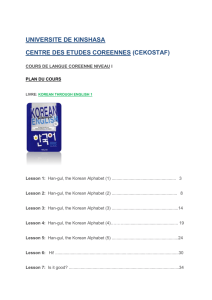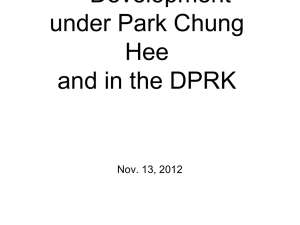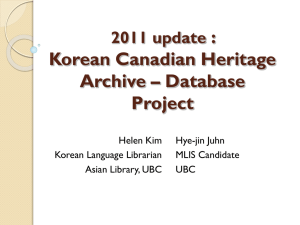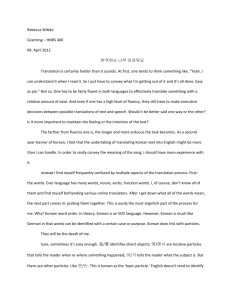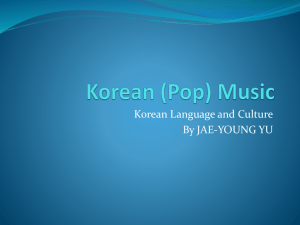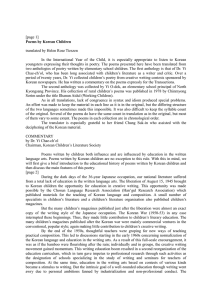Korean Literature in Translation I (KOR 351)
advertisement
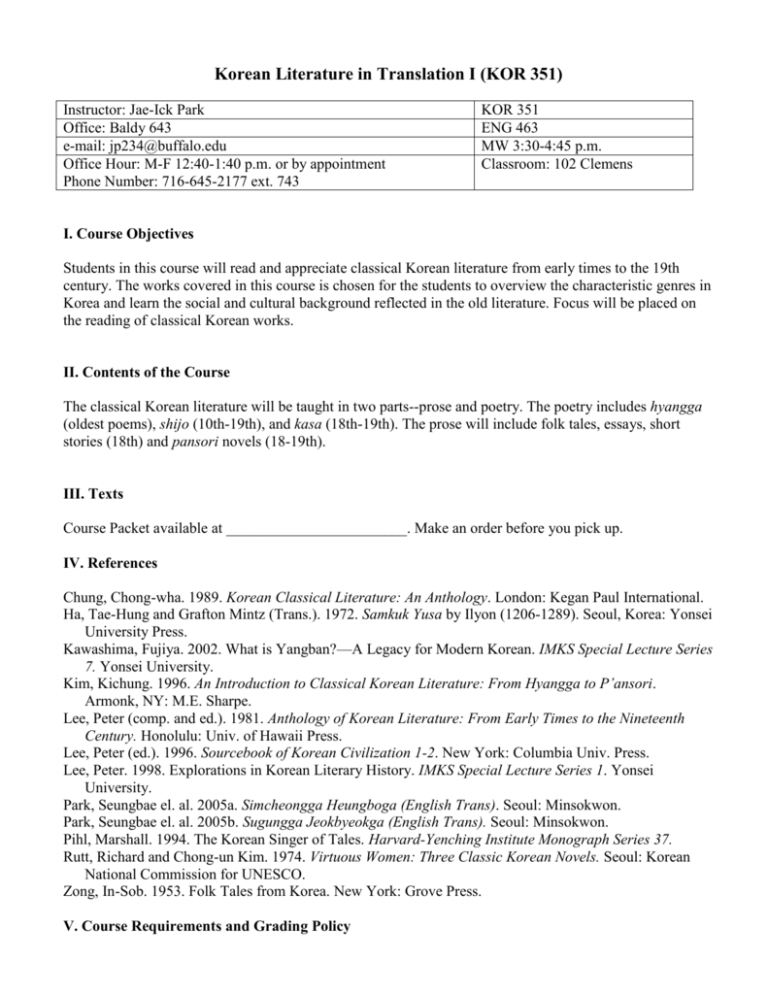
Korean Literature in Translation I (KOR 351) Instructor: Jae-Ick Park Office: Baldy 643 e-mail: jp234@buffalo.edu Office Hour: M-F 12:40-1:40 p.m. or by appointment Phone Number: 716-645-2177 ext. 743 KOR 351 ENG 463 MW 3:30-4:45 p.m. Classroom: 102 Clemens I. Course Objectives Students in this course will read and appreciate classical Korean literature from early times to the 19th century. The works covered in this course is chosen for the students to overview the characteristic genres in Korea and learn the social and cultural background reflected in the old literature. Focus will be placed on the reading of classical Korean works. II. Contents of the Course The classical Korean literature will be taught in two parts--prose and poetry. The poetry includes hyangga (oldest poems), shijo (10th-19th), and kasa (18th-19th). The prose will include folk tales, essays, short stories (18th) and pansori novels (18-19th). III. Texts Course Packet available at ________________________. Make an order before you pick up. IV. References Chung, Chong-wha. 1989. Korean Classical Literature: An Anthology. London: Kegan Paul International. Ha, Tae-Hung and Grafton Mintz (Trans.). 1972. Samkuk Yusa by Ilyon (1206-1289). Seoul, Korea: Yonsei University Press. Kawashima, Fujiya. 2002. What is Yangban?—A Legacy for Modern Korean. IMKS Special Lecture Series 7. Yonsei University. Kim, Kichung. 1996. An Introduction to Classical Korean Literature: From Hyangga to P’ansori. Armonk, NY: M.E. Sharpe. Lee, Peter (comp. and ed.). 1981. Anthology of Korean Literature: From Early Times to the Nineteenth Century. Honolulu: Univ. of Hawaii Press. Lee, Peter (ed.). 1996. Sourcebook of Korean Civilization 1-2. New York: Columbia Univ. Press. Lee, Peter. 1998. Explorations in Korean Literary History. IMKS Special Lecture Series 1. Yonsei University. Park, Seungbae el. al. 2005a. Simcheongga Heungboga (English Trans). Seoul: Minsokwon. Park, Seungbae el. al. 2005b. Sugungga Jeokbyeokga (English Trans). Seoul: Minsokwon. Pihl, Marshall. 1994. The Korean Singer of Tales. Harvard-Yenching Institute Monograph Series 37. Rutt, Richard and Chong-un Kim. 1974. Virtuous Women: Three Classic Korean Novels. Seoul: Korean National Commission for UNESCO. Zong, In-Sob. 1953. Folk Tales from Korea. New York: Grove Press. V. Course Requirements and Grading Policy Attendance (15%) Response Reports (30%) Individual Lecture (10%) Mid-term Essay (15%) Final Paper (20%) Final Presentation (10%) 1. Punctual and perfect attendance is recommended. One undocumented absence or two late will deduct 1% of total coursework (100%). Four or more absences will fail the course. 2. The response report to the assigned reading material should be single-spaced, a half-page long. This can be substituted by a short reading check-up quiz. Students will be given an equal opportunity to share their response to the given literary work. It is not necessarily theoretic. They are expected to show their actual reading the specific work for the class. (Graded 8 times) 3. Individual lecture will be done by introducing a certain portion of the given literary work of the week to the class. (Weeks 9-14). 4. Mid-term essay is intended to have an opportunity to appreciate a work of student’s choice more seriously. It does not require professional theoretical account for the work but may present the characteristics of classical Korean literature. (3-4 pages). 5. Final Paper should be written in 5-7 pages. It should be different from the topic in the mid-term essay. Topics will be chosen by the student, who will get advice from the instructor. 6. The final paper will be presented during the last week. Fifteen (10) minutes of presentation and 5 minutes of questions and answers sessions will be scheduled. One-page handout should be prepared. 7. Grades are given according to the following scale. A : 92-100 A-: 90+ B+: 87+ B: 82+ B-: 80+ C+: 77+ C: 72+ C-: 70+ D+: 67+ D: 62+ D-: 60+ F: 60- VI. Class Schedule (Subject to Change) Wk Dates Topic or Reading Course Pack Further Reference Preparation and Due 1 8/29-31 Class Orientation and Introduction HO Syllabus Introduction to Korean Literature HO Kim, Kichung. 1996 Lee, Peter. 1998 2 3 9/5-7 9/12-14 Hyangga (Poetry Before 10th century) HO Kim, Kichung. 1996:11-23 Shijo (Poetry from 10th-19th Century) HO Kim, Kichung. 1996:75-93 Response report Continued Kim Sisup, The First Novel Written in CP 63-69 Response report Chinese letters in Korea (The New Stories from Mt. Keumo) 4 9/19-21 Heo Kyun, The First Novel Written in CP 12-26 Korean (Hongkiltongjeon) Kim, Kichung. 1996:141- Response report 157 Continued 5 9/26-28 Heo Kyun, Essay on Writing (Munseol) CP1: 9-11 Park Ji Won, Three Short Stories CP1: 29-41 Chung, Chong-wha. 1989 Response report (Heosaengjeon, Yangbanjeon, Hojil) 6 10/3-5 Continued Continued 7 10/10-12 The Life of Mrs. Park of Hamyang CP1: 42-44 The Story of a Young Widow (Anonymous) CP1: 45-50 Zong, In-Sob. 1953 Kawashima, Fujiya. 2002 8 10/17-19 Poetic Epics (Kasa) CP1: 51-58 Chunhyangjeon CP2 Mid-term Essay Rutt, Richard and Chongun Kim. 1974 9 10/24-26 Continued Response report Continued 10 10/31-11/2 Continued Movie View of Chunhyangjeon 11 11/7-10 Shimchongga CP2 Pihl, Marshall. 1994 Response report CP2 Park, Seungbae el. al. Response report Continued 12 11/14-17 Continued Heungboga 2005a 13 11/21-23 Continued Continued 14 11/28-30 Sugungga CP2 Park, Seungbae el. al. 2005b Continued 15 12/5-7 Final Presentation Final Presentation 16 12/12-14 Final Writing Final Paper Due 12/14 (M) Response report
